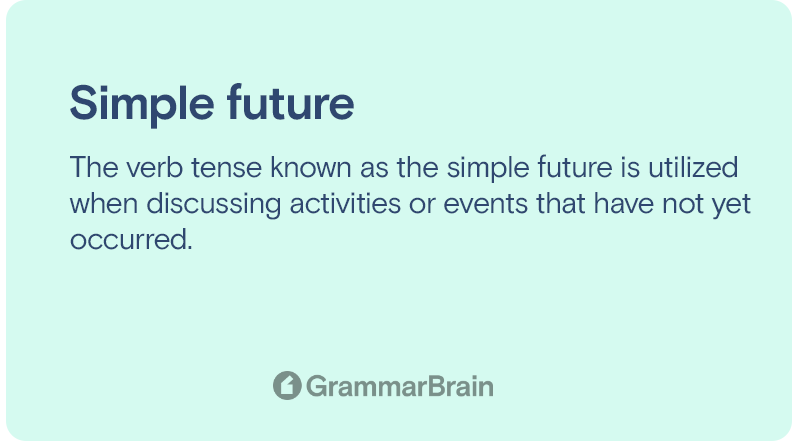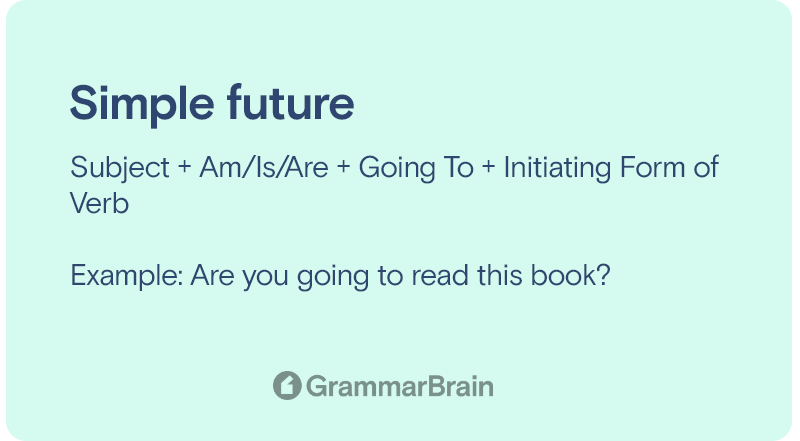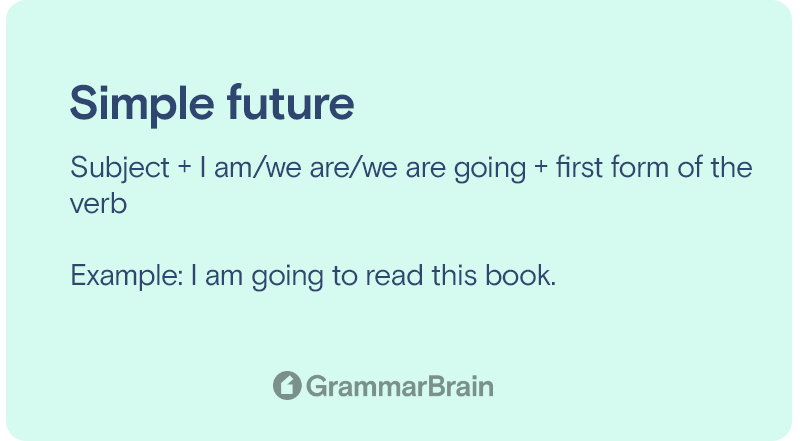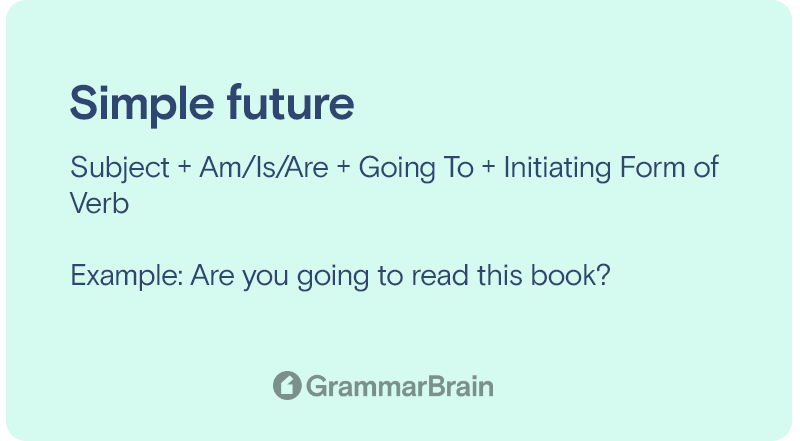What is the future simple verb tense? And how does it work? How are sentences constructed in this tense? The verb tense known as the simple future is utilized when discussing activities or events that have not yet occurred.
Example: Next year, James will travel to Paris.

What is the future simple tense?
To communicate about an activity or circumstance that will start and terminate in the future, simple future can be used.
Because the future simple tense is formed with the modal auxiliary will, it is frequently referred to as the “will tense.” To put it another way, the “will tense” is simply another name for the “will tense.”

How should sentences be formed to reflect the future simple tense?
The construction of a future simple statement is rather uncomplicated. This is the proper way to construct a sentence:
Subject + Will + Main Verb
In the uture Simple tense, negative phrases are formed by inserting the word “not” in between the auxiliary verb and the main verb.
Subject + Will + Not + Main Verb
When writing question sentences, the subject and the auxiliary verb are switched around.
Will + Main Subject + Verb of Action
It makes no difference whether the subject being discussed is solitary or plural because the formula for the simple future remains the same.
The following is a selection of sentences that have been written in the future simple tense:
- I will pick up the books.
- James will open the window.
- Charlie will travel to Paris.
- I will not pick up the books.
- James will not open the window.
- Charlie will not travel to Paris.
- Will you pick up the books?
- Will James open the window?
- Will Charlie travel to Paris?
Note that we often use shall in place of will, especially when referring to I or We.

Another technique to construct sentences using the future simple
There is yet another approach to demonstrating that something will take place in the foreseeable future. It is consistent with the pattern:
Subject + I am/we are/we are going + first form of the verb
For example:
- I am going to read this book.
- James is going to travel to Paris.
- My friends are going to come for a stay.
- Charlie is going to learn a new language.
The construction that uses “going to” quite frequently appears in casual writing and spoken language. It is important to keep in mind, however, that this construction is on the more casual side, therefore when writing formally, it is best to stick to the will + [root form] structure.
This method can also be used to construct negative sentences. This is the framework that will support it:
Subject plus am/is/are plus not going to + initial form of verb
Here are a few instances:
- I am not going to read this book.
- James is not going to travel to Paris.
- My friends are not going to come for a stay.
- Charlie is not going to learn a new language.

In a similar manner, questions can be formulated by utilizing this formula, which is:
Subject + Am/Is/Are + Going To + Initiating Form of Verb
For example:
- Are you going to read this book?
- Is James going to travel to Paris?
- Are your friends going to come for a stay?
- Is Charlie going to learn a new language?
Contraction with the simple form of the future
When we speak in the future simple tense, we frequently condense the subject and the auxiliary verb into the following form:
- I will – I’ll
- He will – He’ll
- They will – They’ll
- You will – You’ll
- She will – She’ll
- We will – We’ll
- It will – It’ll
Contractions with won’t are used in negative statements, such as this one:
- I will not – I won’t
- He will not – He won’t
- They will not – They won’t
- You will not – You won’t
- She will not – She won’t
We will not – We won’t
It will not – It won’t
What does it mean to speak in the simple future tense?
No plan
When there is no predetermined plan or determination to carry out an action before we speak, we utilize the Future Simple tense. The decision is made on the spot, right as we’re having the conversation.
Prediction
When we make forecasts about the future, we frequently employ the simple future form of the verb. Once more, there is no concrete plan. What we are predicting is what we believe will take place.
Be
If we have already made up our minds or come to a conclusion before we speak. In such cases, we can still employ the future simple tense when the main word is “be.”
What is the key distinction between the Future Simple and the Future Perfect tenses?
Both the future simple and the future perfect share certain similarities and have some distinct distinctions; this could lead to some confusion.
What is the most important distinction?
The future simple tense is utilized most frequently when we are discussing the choices that we have made. However, the future perfect tense is used to speculate on when certain events will come to a close.
An examination of the differences and similarities between future simple and future perfect tenses
1. The process of making decisions
We utilize the future simple tense when we want to talk about choices that we will make for the future.
Examples:
2. Future events
Both of these tenses typically represent acts that will take place in the future, yet they communicate different actions and events.
Examples:
- James will complete his assignment.
- Selena will talk to her brother.
- I will inform her.
- The teacher will collect the assignments.
3. The finishing of the actions
When we talk about what we think will happen in the future, we employ the future perfect tense. We have the propensity to speculate about the moment at which actions and occurrences will be finished.
Examples:
- James will have completed his assignment by next week.
- My sister will have bought her new car by next year.
4. The sequence of occurrences
The future perfect tense can also serve as a comparative tense in some contexts. This indicates that we use this tense to compare events and actions in order to forecast which one will come to a conclusion first.
Examples:
- James will have finished eating by the time lunch begins.
- Charlie will sleep by the time his girlfriend comes home.
Important guidelines and reminders regarding the use of the future simple tense
When using future simple tense, a few considerations should be observed:
The form of the verb that corresponds to the simple future tense should always include two verbs: the basic form of the verb, as well as the auxiliary verb “will.”
‘Will’ is used as the assisting verb at the beginning of interrogative phrases. It is then followed by the subject and the base form of the main verb.
It is possible to recognize a negative statement by the inclusion of the word “not” following the auxiliary verb “will” in the phrase.
It is important to keep in mind that the assisting word “will” is what primarily signals to the reader or listener. It lets them know that the tense that is being employed speaks about the future or an event that is going to take place in the future.
| Tense | Function | Rule | Example |
| Present simple | Helps to describe habits, facts, actions, and truth that are not affected by time | Ist form of verb + s/es | He loves pizza. |
| Past simple | Helps to describe events that have happened in the past | IInd form of the verb | She wore a beautiful dress for the party. |
| Future simple | Helps to describe events that will happen in the future | Will/ shall + Ist form | He will go to New York tomorrow. |
| Present perfect | Helps to describe the relevance of past events in the present moment | Has/ have + IIIrd form of the verb | I have learned to ride a bike. |
| Past perfect | Helps to describe events that happened prior to other events in the past | Had + IIIrd form of the verb | She had finished the paper before leaving the hall. |
| Future perfect | Helps to describe events that will be completed between now and a specific point in the future | Will/ have + IIIrd form of the verb | She will have finished the book by tomorrow. |
| Present continuous | Helps to describe ongoing actions | Is/ am/ are + Ist form + ing | She is reading a book. |
| Past continuous | Helps to describe ongoing events of the past, mostly in relation to another event | Was/ were + Ist form + ing | He was driving to work when the accident happened. |
| Future continuous | Helps to describe future events that will/are expected to continue for a period of time | Will be + Ist form + ing | I will be going to meet my grandparents tomorrow. |
| Present perfect continuous | Helps to describe events that started in the past and will continue into the present | Has/ have been + Ist form + ing | She has been writing a book for the past one year. |
| Past perfect continuous | Helps to describe events that began, continued, and ended in the past | Had been + Ist form + ing | I had been working in this company for ten years when I got the promotion. |
| Future perfect continuous | Helps to describe events that began in the past but will continue until a point in the future | Will/ shall have been + Ist form + ing | I will have been doing business with her for one year. |
FAQs
When do we use the future tense in its simplest form?
A verb phrase written in the simple future tense indicates that the activity being described will take place at some point in the future. This tense places both the beginning and the end of the action in the future itself.
What is the structure of the future tense in its most basic form?
With the use of the following formula, the simple future tense can be simply comprehended and employed in written and spoken language:
The structure of a sentence should be:
Subject + Will + the fundamental form of the verb + the rest of the sentence.
What are some examples of the future tense in its simplest form?
Several illustrations of the correct use of the future simple tense are provided below:
- James will pay a visit to his grandmother next week.
- I will complete my homework tonight by ten o’clock at the latest.
- Charlie will have a conversation with Nina tomorrow.
- The members of the team are going to present their work the following week.
- She plans to swim in the local pool this evening.
Sources
- Future Simple vs. Future Perfect
- Simple Future Tense
- Future Simple
- THE SIMPLE FUTURE TENSE
- Simple Future Tense: Rules And Examples
- Future Simple, Future Continuous, and Future Perfect
- Future Simple vs Future Perfect
Inside this article
Fact checked:
Content is rigorously reviewed by a team of qualified and experienced fact checkers. Fact checkers review articles for factual accuracy, relevance, and timeliness. Learn more.
Core lessons
Glossary
- Abstract Noun
- Accusative Case
- Anecdote
- Antonym
- Active Sentence
- Adverb
- Adjective
- Allegory
- Alliteration
- Adjective Clause
- Adjective Phrase
- Ampersand
- Anastrophe
- Adverbial Clause
- Appositive Phrase
- Clause
- Compound Adjective
- Complex Sentence
- Compound Words
- Compound Predicate
- Common Noun
- Comparative Adjective
- Comparative and Superlative
- Compound Noun
- Compound Subject
- Compound Sentence
- Copular Verb
- Collective Noun
- Colloquialism
- Conciseness
- Consonance
- Conditional
- Concrete Noun
- Conjunction
- Conjugation
- Conditional Sentence
- Comma Splice
- Correlative Conjunction
- Coordinating Conjunction
- Coordinate Adjective
- Cumulative Adjective
- Dative Case
- Determiner
- Declarative Sentence
- Declarative Statement
- Direct Object Pronoun
- Direct Object
- Diction
- Diphthong
- Dangling Modifier
- Demonstrative Pronoun
- Demonstrative Adjective
- Direct Characterization
- Definite Article
- Doublespeak
- False Dilemma Fallacy
- Future Perfect Progressive
- Future Simple
- Future Perfect Continuous
- Future Perfect
- First Conditional
- Irregular Adjective
- Irregular Verb
- Imperative Sentence
- Indefinite Article
- Intransitive Verb
- Introductory Phrase
- Indefinite Pronoun
- Indirect Characterization
- Interrogative Sentence
- Intensive Pronoun
- Inanimate Object
- Indefinite Tense
- Infinitive Phrase
- Interjection
- Intensifier
- Infinitive
- Indicative Mood
- Participle
- Parallelism
- Prepositional Phrase
- Past Simple Tense
- Past Continuous Tense
- Past Perfect Tense
- Past Progressive Tense
- Present Simple Tense
- Present Perfect Tense
- Personal Pronoun
- Personification
- Persuasive Writing
- Parallel Structure
- Phrasal Verb
- Predicate Adjective
- Predicate Nominative
- Phonetic Language
- Plural Noun
- Punctuation
- Punctuation Marks
- Preposition
- Preposition of Place
- Parts of Speech
- Possessive Adjective
- Possessive Determiner
- Possessive Case
- Possessive Noun
- Proper Adjective
- Proper Noun
- Present Participle
- Prefix
- Predicate



